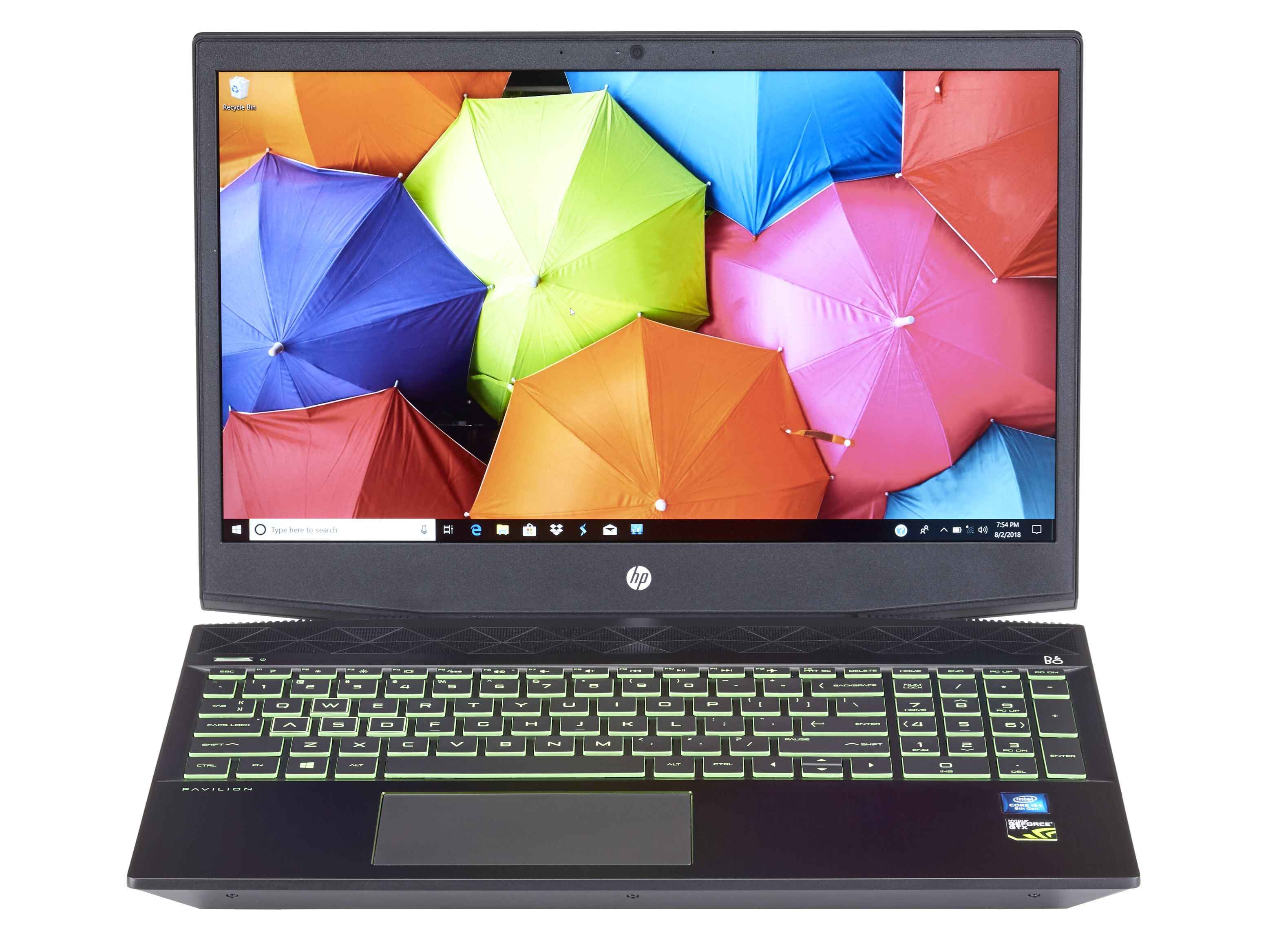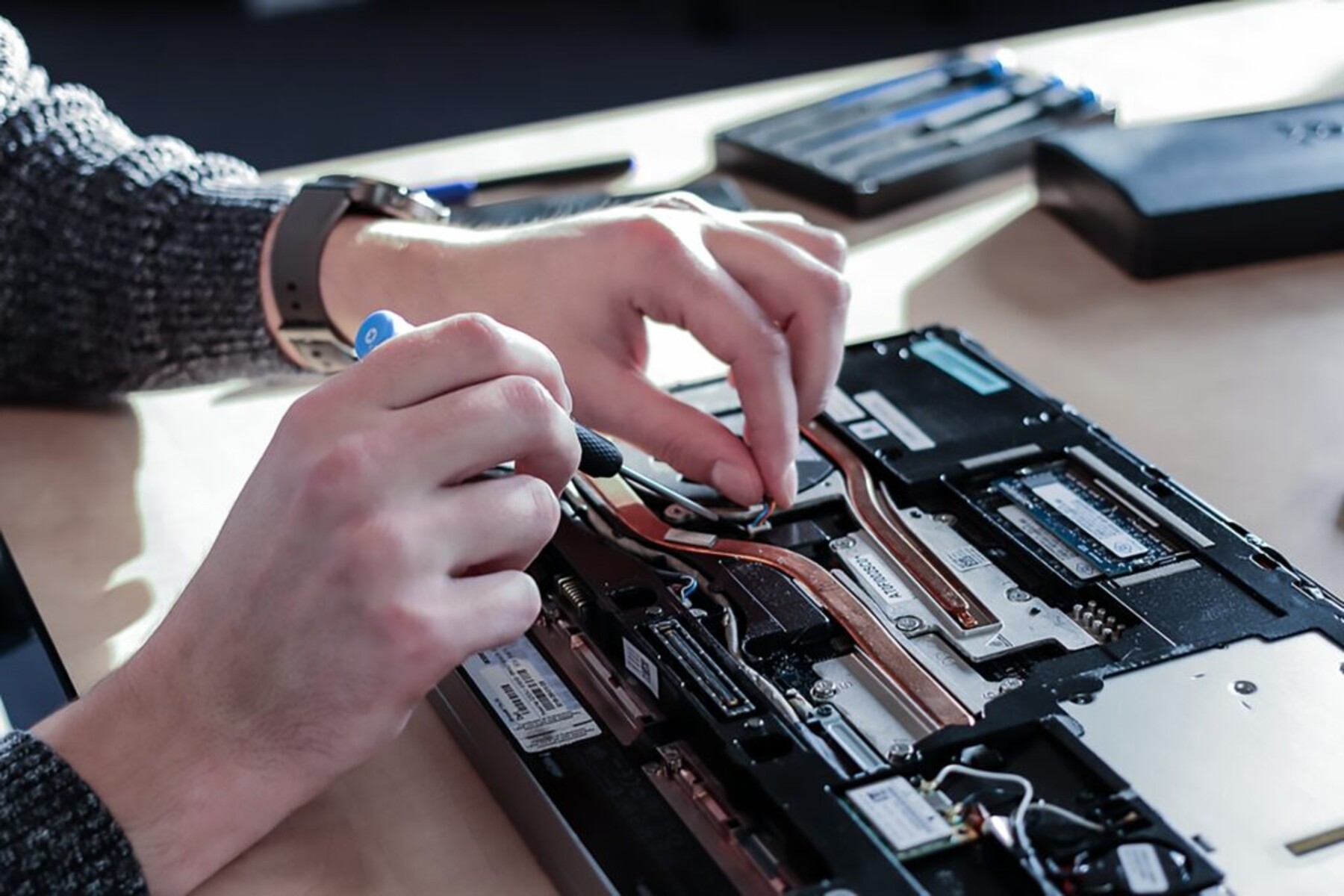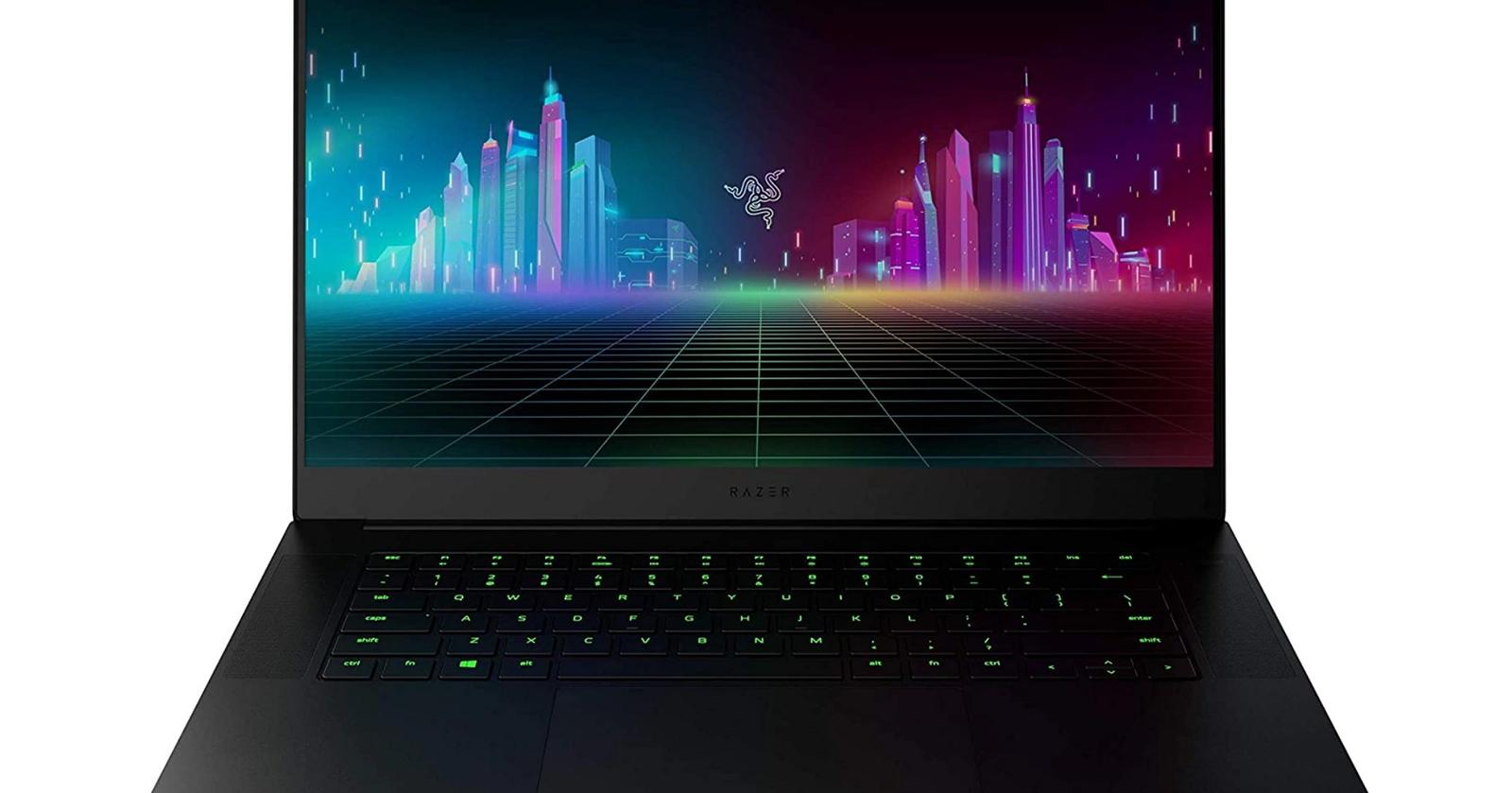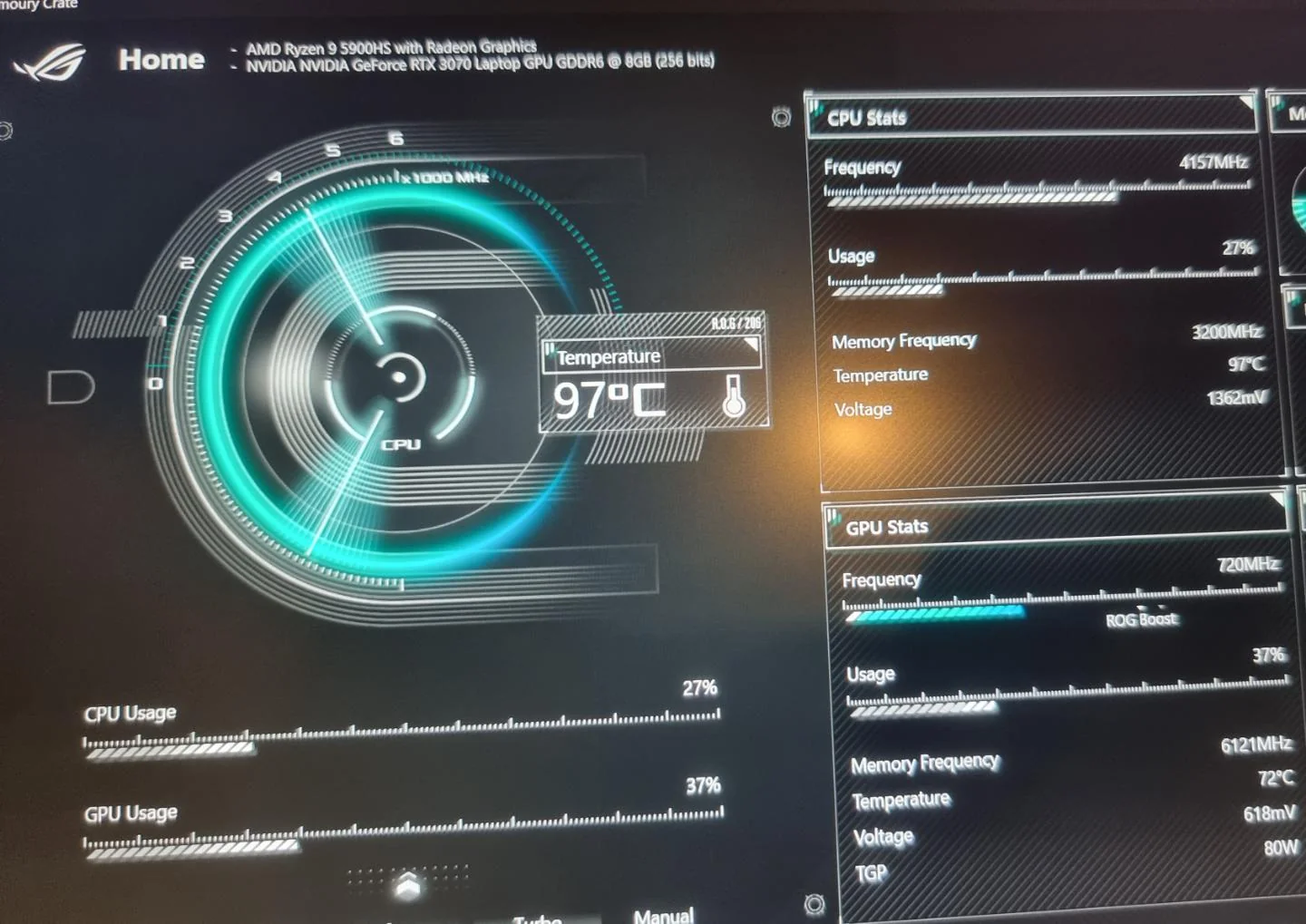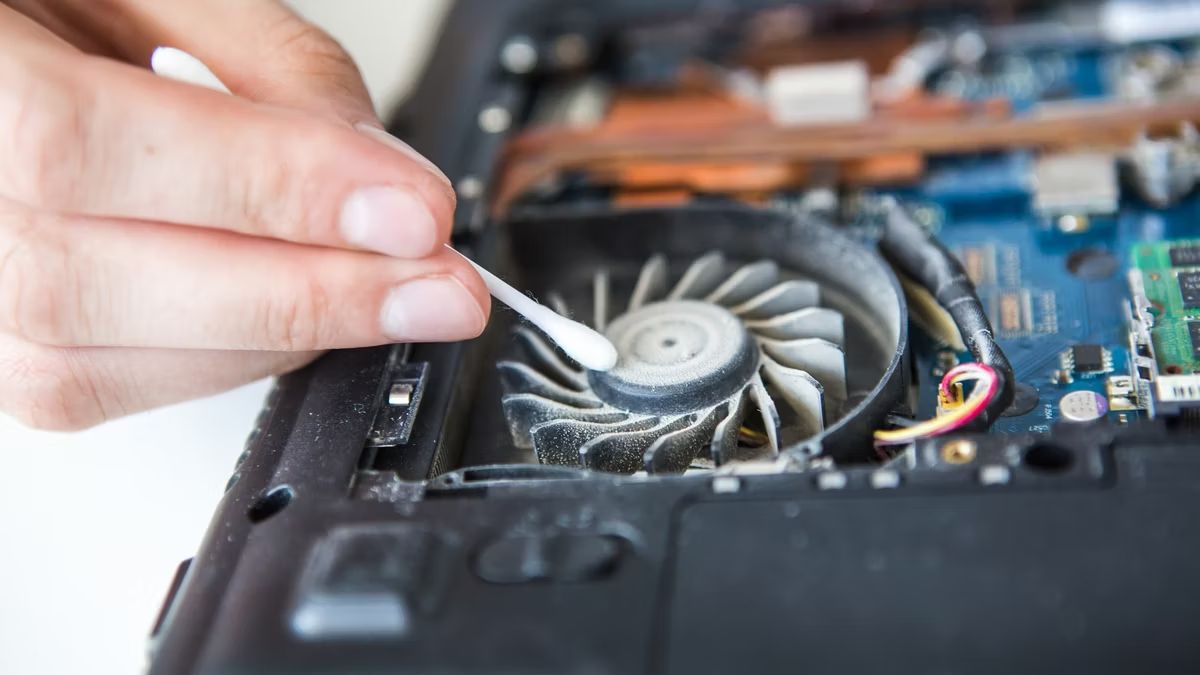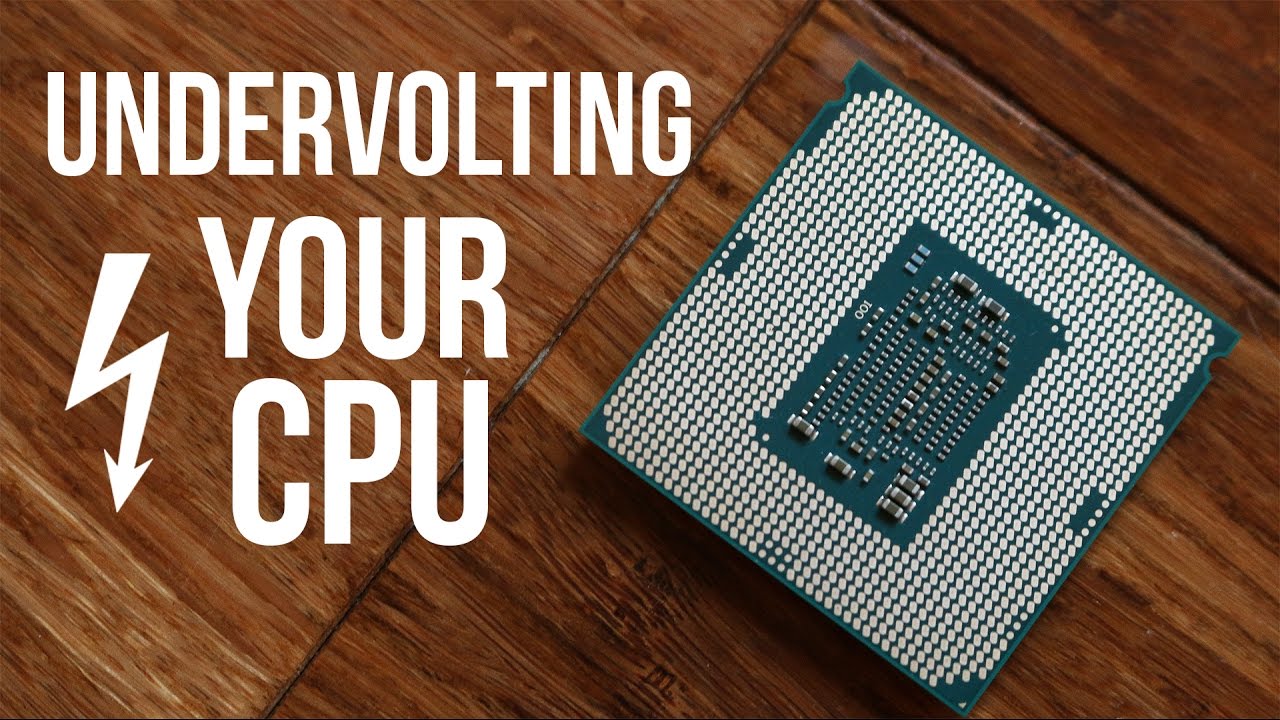Introduction
Gaming laptops have become increasingly popular among gamers due to their high-performance capabilities and portability. However, one common issue that gamers encounter with their laptops is freezing. This frustrating problem can disrupt your gaming experience and cause significant inconvenience.
When a gaming laptop freezes, it means that the system becomes unresponsive and stops functioning temporarily. This can happen during gameplay or at random moments, causing you to lose progress, miss out on important in-game events, or even crash the game entirely. Understanding the reasons behind your gaming laptop freezing can help you troubleshoot and resolve the problem.
In this article, we will explore some of the common causes of freezing in gaming laptops and provide you with actionable solutions to fix the issue. Whether you’re a casual gamer or a dedicated enthusiast, following these tips will help ensure a smoother and more enjoyable gaming experience.
Note that while these solutions are generally effective, it’s important to keep in mind that every gaming laptop is unique, and additional factors may be at play. If your freezing issue persists after trying the recommended solutions, it may be necessary to seek professional assistance for a more in-depth diagnosis and repair.
Background Information
Gaming laptops are specially designed to handle the demanding requirements of modern video games. They typically sport powerful processors, dedicated graphics cards, and ample RAM, allowing gamers to enjoy high-quality graphics and smooth gameplay. However, despite their impressive specifications, gaming laptops are not immune to technical issues, including freezing.
When a gaming laptop freezes, it can be caused by a variety of factors, ranging from software-related issues to hardware malfunctions. Understanding these potential causes can help you troubleshoot and resolve the problem effectively.
One of the most common causes of freezing in gaming laptops is overheating. As you play resource-intensive games, the internal components of your laptop generate heat. If the cooling system is not functioning optimally or if there is a buildup of dust and debris, the excess heat can cause the laptop to freeze. Another common culprit is insufficient RAM. Gaming requires a significant amount of memory, and if your laptop is running low on RAM, it may struggle to handle the game’s requirements, leading to freezing.
Outdated or faulty drivers can also contribute to freezing issues. Graphics drivers, in particular, are essential for rendering the visuals in games. If these drivers are outdated, incompatible, or corrupted, they can cause your gaming laptop to freeze during gameplay. Similarly, malware or viruses on your system can impact performance and result in freezing episodes.
Additionally, insufficient disk space can hinder the smooth functioning of your gaming laptop. When your hard drive is nearly full, it can slow down the access and retrieval of necessary game files, leading to freezing. Finally, playing games on high graphics settings can put a strain on your laptop’s hardware, especially if it is not equipped to handle the demands of the game at maximum settings. This can cause freezing and other performance issues.
Now that we have a better understanding of the background information related to freezing in gaming laptops, let’s delve into the specific causes and effective solutions to help resolve this frustrating issue.
Common Causes of Freezing in Gaming Laptops
Gaming laptops are designed to deliver exceptional gaming performance, but they can still experience freezing issues. Understanding the common causes behind these freezing episodes is crucial to troubleshooting and resolving the problem effectively.
Here are some of the most prevalent causes of freezing in gaming laptops:
- Overheating Issues: Gaming laptops generate a significant amount of heat during gameplay due to the demanding requirements of modern games. If the cooling system is inadequate or obstructed by dust and debris, the excess heat can cause the laptop to freeze.
- Insufficient RAM: Gaming requires a substantial amount of memory to process various game data. If your laptop has insufficient RAM, it may struggle to handle the game’s requirements, leading to freezing.
- Outdated or Faulty Drivers: Graphics drivers play a crucial role in rendering game visuals. Outdated, incompatible, or corrupted drivers can result in freezing during gameplay.
- Malware or Viruses: If your gaming laptop is infected with malware or viruses, it can significantly impact system performance, causing freezing and other issues.
- Insufficient Disk Space: When your hard drive is nearly full, it can slow down the access and retrieval of necessary game files, leading to freezing.
- High Graphics Settings: Playing games on high graphics settings can put a strain on your laptop’s hardware. If your laptop’s components are not equipped to handle the demands of the game at maximum settings, freezing and other performance issues may occur.
- Hardware Issues: Faulty hardware components, such as a failing hard drive or defective memory modules, can cause freezing in gaming laptops.
By identifying these common causes of freezing, you can take targeted actions to resolve the issue and prevent future occurrences. In the next section, we will explore effective solutions for fixing freezing issues in gaming laptops.
Overheating Issues
One of the most common causes of freezing in gaming laptops is overheating. Gaming laptops generate a significant amount of heat during gameplay due to the powerful components and intensive processing required for modern games. When the internal temperature rises beyond optimal levels, the laptop’s performance can be compromised, leading to freezing and other issues.
Several factors contribute to overheating in gaming laptops:
- Dust and Debris: Over time, dust and debris can accumulate inside the laptop, obstructing the airflow and impeding the cooling system’s efficiency. This prevents the heat generated by the components from dissipating, resulting in overheating.
- Insufficient Cooling System: Some gaming laptops may have inadequate cooling systems that struggle to keep up with the heat generated during intense gameplay sessions. This can lead to rapid temperature increases and freezing.
- Inadequate Ventilation: Placing your laptop on soft surfaces, such as blankets or pillows, can obstruct the air intake vents on the bottom of the laptop. This restricts airflow and promotes overheating.
To address overheating issues and prevent your gaming laptop from freezing, here are some solutions:
- Cleaning the Cooling System: Regularly cleaning the cooling system is crucial for optimal airflow and heat dissipation. Use compressed air or a soft brush to remove dust and debris from the vents and cooling fans. This helps prevent overheating and keeps your laptop running cool.
- Using a Cooling Pad: A cooling pad is an accessory that sits underneath your laptop and helps improve airflow by providing additional cooling. These pads have built-in fans that direct cool air toward the laptop’s bottom, reducing the temperature and preventing freezing.
- Elevating the Laptop: By elevating the laptop using a laptop stand or even a stack of books, you can create a gap between the laptop and the surface it rests on. This allows for better airflow, helping to dissipate heat and prevent overheating.
Implementing these solutions can effectively address overheating issues in your gaming laptop, reducing the likelihood of freezing and enhancing its overall performance. However, if the freezing problem persists or worsens, it may be indicative of other underlying causes that require further investigation.
Insufficient RAM
Insufficient RAM (random access memory) is another common cause of freezing in gaming laptops. RAM is essential for quickly accessing and storing data that the laptop needs to run applications, including games. When your laptop runs out of available RAM while gaming, it may struggle to handle the game’s requirements, leading to freezing and stuttering gameplay.
Here are a few reasons why insufficient RAM can cause freezing:
- Inadequate Memory Allocation: Some games require a significant amount of RAM to run smoothly. If your laptop does not have enough RAM installed, the system may be unable to allocate sufficient memory for the game, resulting in freezing and poor performance.
- Running Multiple Applications: Running additional applications in the background while gaming can consume a substantial portion of your RAM, leaving less available for the game. This can lead to freezing and lag spikes as the laptop struggles to handle the simultaneous demands.
- Resource-Intensive Games: Modern games often have high graphics requirements and demand more memory to store and process assets. If your laptop’s RAM capacity is not sufficient to meet these requirements, the game may freeze or crash during gameplay.
To address insufficient RAM and prevent freezing in gaming laptops, consider the following solutions:
- Upgrading or Adding RAM: If your laptop allows for RAM upgrades, consider increasing the amount of memory. Consult your laptop’s documentation or manufacturer website to determine the maximum supported RAM capacity and the type of RAM modules compatible with your device. Adding more RAM can provide the necessary resources for smooth gameplay and help eliminate freezing issues.
- Closing Unnecessary Applications: Before launching a game, close any unnecessary applications running in the background. This frees up RAM and ensures that the majority of available memory is allocated to the game, reducing the chances of freezing.
- Optimizing Game Settings: Adjusting in-game settings to decrease the overall demand on your laptop’s resources can help alleviate strain on the RAM. Lowering graphics settings, reducing texture quality, or disabling resource-intensive features can reduce the amount of memory required and mitigate freezing issues.
By implementing these solutions and ensuring that your laptop has sufficient RAM for gaming, you can improve performance, reduce freezing, and enjoy a smoother gaming experience.
Outdated or Faulty Drivers
Outdated or faulty drivers can contribute to freezing issues in gaming laptops. Drivers are software components that enable communication between the operating system and various hardware devices in your laptop. Graphics drivers, in particular, are crucial for rendering game visuals and ensuring smooth gameplay. If these drivers are outdated, incompatible, or corrupted, they can cause your gaming laptop to freeze during gameplay.
Here are a few reasons why outdated or faulty drivers can lead to freezing:
- Incompatibility: Operating system updates or game patches may require updated drivers to function correctly. If your drivers are outdated, they might not be compatible with the updated software, leading to freezing and other performance issues.
- Stability Issues: Outdated or faulty drivers can introduce stability issues to your system. These issues may manifest as freezing, crashes, or other unpredictable behavior during gameplay.
- Performance Optimization: Driver updates often include performance optimizations and bug fixes that can improve the stability and performance of your gaming laptop. Running outdated drivers may result in decreased performance and an increased likelihood of freezing.
To address issues related to outdated or faulty drivers and prevent freezing in gaming laptops, consider the following solutions:
- Update Graphics Drivers: Visit the website of your laptop manufacturer or the graphics card manufacturer to check for the latest driver updates. Download and install the recommended drivers for your specific graphics card model.
- Automated Driver Update Tools: Alternatively, you can utilize automated driver update tools to scan your system for outdated drivers and install the latest versions. These tools can simplify the process of keeping your drivers up to date.
- Driver Rollback: If you experience freezing issues after updating your drivers, it’s possible that the new drivers are causing the problem. In such cases, you can roll back to a previous version of the drivers that were known to work well for your system.
Regularly updating drivers, especially graphics drivers, can help ensure compatibility, stability, and optimal performance for your gaming laptop. By taking these steps, you can minimize the risk of freezing caused by outdated or faulty drivers and enjoy a smoother gaming experience.
Malware or Viruses
Malware or viruses on your gaming laptop can significantly impact its performance and lead to freezing issues. Malicious software can interfere with system processes, consume valuable resources, and disrupt the smooth operation of your laptop.
Here are a few ways in which malware or viruses can cause freezing:
- Resource Consumption: Some malware can run in the background, consuming valuable system resources such as processing power and memory. This can cause your gaming laptop to freeze or experience significant slowdowns.
- Interrupted System Operations: Viruses or malware can interfere with critical system operations, causing instability and crashes. This can result in freezing during gameplay or any other computer activity.
- Unauthorized Modifications: Certain types of malware can modify system files or settings, leading to conflicts or errors that cause your gaming laptop to freeze.
To address malware or virus-related freezing issues in gaming laptops, consider the following solutions:
- Install Reliable Antivirus Software: Make sure your gaming laptop has reputable antivirus software installed. Regularly update the antivirus definitions and perform full system scans to detect and remove any malware or viruses that may be causing freezing issues.
- Scan for Malware Using On-Demand Scanners: Some antivirus software includes on-demand scanning tools that allow you to scan specific files or directories for malware. If you suspect a particular file or folder is infected, perform a targeted scan to identify and eliminate any threats.
- Enable Firewall Protection: Enable the built-in firewall on your gaming laptop to help block unauthorized network connections and prevent malware from infiltrating your system.
- Exercise Safe Browsing Habits: Avoid clicking on suspicious links, downloading files from untrusted sources, or visiting potentially harmful websites. Practicing safe browsing habits reduces the risk of inadvertently downloading malware onto your gaming laptop.
By implementing these solutions and regularly maintaining a secure system, you can minimize the risk of malware or virus-related freezing issues on your gaming laptop. Remember, prevention is key, so take proactive steps to ensure the security and stability of your system.
Insufficient Disk Space
Insufficient disk space can contribute to freezing issues in gaming laptops. When your hard drive becomes full or nearly full, it can hinder the smooth functioning of your laptop and lead to freezing during gameplay. This is because the system requires adequate space to store and access the necessary game files and data.
Here are a few ways in which insufficient disk space can cause freezing:
- File Fragmentation: As your hard drive fills up, files can become fragmented, meaning they are scattered across different sections of your disk. This can slow down the retrieval and loading of game files, resulting in freezing.
- Virtual Memory Issues: When you run out of physical RAM, the operating system uses a portion of your hard drive to create virtual memory, also known as the page file. If your hard drive is nearly full, there may not be enough space for the page file to function properly, leading to freezing.
- Delayed Read/Write Operations: When your hard drive has insufficient space, read and write operations can be delayed as the system tries to find available space. This delay can cause freezing and impact overall system performance.
To address insufficient disk space and prevent freezing in gaming laptops, consider the following solutions:
- Cleaning Up Unnecessary Files: Delete any temporary files, old downloads, or other unnecessary files to free up disk space. This can be done manually or by using disk cleanup tools provided by the operating system.
- Uninstalling Unused Applications: Remove any applications or games that you no longer use to reclaim space on your hard drive. This can significantly increase available disk space and alleviate freezing issues.
- Performing Disk Defragmentation: Use the disk defragmentation tool provided by your operating system to consolidate fragmented files. This helps optimize file access and can improve system performance, reducing the chances of freezing.
- Consider Upgrading to a Larger Hard Drive or Adding an SSD: If you consistently struggle with insufficient disk space, you may want to consider upgrading to a larger capacity hard drive or adding a solid-state drive (SSD). This provides more space for game files and can improve overall system performance.
By implementing these solutions and regularly managing your disk space, you can ensure that your gaming laptop has sufficient room to operate smoothly without freezing. It is important to periodically monitor and optimize your disk space to maintain optimal performance and prevent storage-related issues.
High Graphics Settings
Playing games on high graphics settings can put a strain on your gaming laptop’s hardware, especially if it is not adequately equipped to handle the demands of the game at maximum settings. This can lead to freezing, stuttering gameplay, and other performance issues.
Here are a few reasons why high graphics settings can cause freezing in gaming laptops:
- Increased GPU and CPU Load: High graphics settings require your gaming laptop’s graphics processing unit (GPU) and central processing unit (CPU) to work harder. If your laptop’s hardware is not powerful enough to handle the increased load, it may become overwhelmed and freeze during gameplay.
- Insufficient Video Memory: High graphics settings can consume a significant amount of video memory, or VRAM. If your laptop has limited VRAM or if it is already being used by other applications, the system may experience freezing as it struggles to allocate enough memory for the game.
- Thermal Issues: Running games at high graphics settings generates more heat, placing additional stress on your laptop’s cooling system. If the cooling system is inadequate or unable to cope with the increased heat, the laptop may overheat and freeze as a result.
To address freezing caused by high graphics settings, consider the following solutions:
- Lower Graphics Settings: Adjust the in-game graphics settings to a level that your gaming laptop can comfortably handle. Lowering settings such as resolution, texture quality, and effects can reduce the strain on your hardware and help prevent freezing.
- Limit Background Processes: Close any unnecessary applications or processes running in the background that may consume system resources. This can free up CPU and memory resources for your game, allowing it to run more smoothly and reducing the chances of freezing.
- Upgrade Hardware: If your gaming laptop consistently struggles to handle games at high graphics settings, it may be time to consider upgrading certain hardware components. This could include upgrading the GPU, adding more RAM, or investing in a faster CPU. Upgrading hardware can provide the necessary power and resources to run games smoothly without freezing.
By adjusting graphics settings appropriately, managing background processes, and upgrading hardware as needed, you can strike a balance between visual quality and system performance. This will help prevent freezing and ensure a smoother gaming experience on your laptop.
Hardware Issues
Hardware issues can be a significant contributing factor to freezing problems in gaming laptops. Despite their robust specifications, gaming laptops are not immune to hardware failures, which can cause the system to freeze during gameplay or even during regular computer activities.
Here are a few common hardware issues that can lead to freezing:
- Faulty Memory Modules: Defective or failing memory modules can result in freezing and crashes. Insufficient or faulty RAM can disrupt the smooth operation of your gaming laptop, leading to freezing during gaming sessions.
- Failure of Hard Drive or Solid-State Drive: A failing hard drive or SSD can cause freezing as the system struggles to read or write data. This can manifest as slowdowns, unresponsiveness, or even sudden crashes during gameplay.
- Issues with Graphics Card: Problems with the graphics card can cause freezing, artifacting, and graphical glitches during gaming. Overheating, driver issues, or hardware malfunctions can all impact the performance of the graphics card and result in freezing.
- Power Supply Problems: A faulty or insufficient power supply can cause instability and freezing. If your gaming laptop is not receiving enough power or if there are inconsistencies in power delivery, freezing issues can occur.
- CPU Overheating: Overheating of the central processing unit (CPU) can lead to thermal throttling, where the processor reduces its performance to prevent damage. This can cause freezing and performance degradation during gaming.
It is important to note that diagnosing and resolving hardware issues may require professional expertise or specialized tools. If you suspect that hardware problems are causing freezing in your gaming laptop, consider the following steps:
- Check Component Temperatures: Monitor the temperatures of your CPU and GPU using software utilities that provide real-time temperature readings. Excessive temperatures can indicate overheating issues that may require additional cooling or hardware maintenance.
- Test and Swap Memory Modules: If you suspect faulty RAM, try testing each memory module individually to identify any defective modules. You can then replace the faulty modules with new ones to resolve freezing issues.
- Run Hard Drive Tests: Perform diagnostic tests on your hard drive or SSD to check for any errors or failures. If issues are detected, it may be necessary to replace the storage device with a new one.
- Verify Graphics Card Functionality: Test your graphics card in a separate system or use diagnostic tools to verify its health. If the card is deemed faulty, you may need to replace it with a new one.
- Seek Professional Help: If you are unsure about diagnosing or resolving hardware issues on your own, it is recommended to seek professional assistance from a qualified technician or contact the manufacturer’s support team for guidance.
Hardware issues can be complex and require specific expertise to diagnose and resolve. Therefore, if you suspect hardware problems as the cause of freezing in your gaming laptop, it is best to consult a professional for an accurate assessment and appropriate repair.
How to Fix Freezing Issues in Gaming Laptops
Experiencing freezing issues in a gaming laptop can be highly frustrating, but there are several effective solutions that can help resolve the problem. By implementing these troubleshooting steps, you can enjoy a smoother gaming experience without interruptions due to freezing.
Here are various ways to fix freezing issues in gaming laptops:
- Cleaning the Cooling System: Overheating is a common cause of freezing in gaming laptops. Regularly clean the cooling system to remove dust and debris that may obstruct airflow, using compressed air or a soft brush.
- Upgrading or Adding RAM: If your gaming laptop has insufficient RAM, consider upgrading or adding more memory to provide the necessary resources for smooth gameplay.
- Updating Drivers: Outdated or faulty drivers can cause freezing, especially graphics drivers. Visit the manufacturer’s website to download and install the latest driver updates.
- Running Antivirus Scans: Malware and viruses can negatively impact system performance and cause freezing. Use reliable antivirus software to scan your laptop and remove any malicious software.
- Clearing Disk Space: Insufficient disk space can hinder smooth functioning. Delete unnecessary files, uninstall unused applications, and perform disk cleanup to free up space.
- Adjusting Graphics Settings: Lower the graphics settings in games to reduce the strain on your hardware and prevent freezing. Lowering resolution, texture quality, and effects can improve performance.
- Seeking Professional Help for Hardware Issues: If freezing persists despite attempting the above solutions, it may indicate hardware problems. Consult a professional technician to diagnose and fix any faulty hardware components causing the freezing issues.
Remember that every gaming laptop is unique, and additional factors may contribute to freezing beyond the common causes mentioned. It may require a combination of these solutions or further investigation to resolve the issue completely.
By following these suggested steps and maintaining regular maintenance and care for your gaming laptop, you can minimize freezing issues and enjoy a more seamless and immersive gaming experience.
Cleaning the Cooling System
Regularly cleaning the cooling system of your gaming laptop is essential for preventing overheating and addressing freezing issues. Over time, dust and debris can accumulate inside the laptop, obstructing airflow and impeding the cooling system’s efficiency. This can lead to increased temperatures and cause your laptop to freeze during intense gaming sessions.
Here are some steps to effectively clean the cooling system of your gaming laptop:
- Power Off and Unplug: Before starting the cleaning process, ensure that your gaming laptop is powered off and disconnected from the power source to prevent any accidents or damage.
- Access the Cooling System: Depending on your laptop model, you may need to remove a panel or unscrew a cover to access the cooling vents and fans. Refer to your laptop’s user manual or manufacturer’s website for specific instructions.
- Use Compressed Air: With a can of compressed air, blow short bursts of air into the vents and fans to dislodge the dust and debris. Hold the can upright and at a safe distance to prevent liquid from escaping the canister.
- Focus on the Vents and Fans: Pay special attention to the cooling vents and fans as they are the primary areas where dust and debris accumulate. Direct the airflow towards these areas to remove any build-up effectively.
- Be Thorough but Gentle: Take care not to damage any delicate components while cleaning. Use a soft brush or cotton swabs to gently remove stubborn dust from the small crevices or hard-to-reach areas.
- Repeat if Necessary: If the cooling system is heavily clogged, you may need to repeat the process to ensure a thorough cleaning. Be patient and thorough to remove as much dust and debris as possible.
- Reassemble: Once you are satisfied with the cleaning, reassemble any removed panels or covers following the manufacturer’s instructions. Ensure that everything is securely in place.
Regularly cleaning the cooling system of your gaming laptop, ideally every few months or as needed, helps maintain optimal airflow and prevent overheating. This can significantly reduce the risk of freezing and prolong the lifespan of your laptop’s components.
It is important to note that if you are uncomfortable performing the cleaning yourself or if you are unsure about the process, it is recommended to seek professional assistance from a technician who specializes in laptop maintenance.
Upgrading or Adding RAM
If your gaming laptop is experiencing freezing issues, insufficient RAM (random access memory) may be the culprit. Gaming requires a significant amount of memory to store and process game data. When your laptop runs out of available RAM, it may struggle to handle the requirements, leading to freezing and slowdowns during gameplay.
Upgrading or adding RAM to your gaming laptop can significantly improve its performance and help alleviate freezing issues. Here’s what you need to know:
1. Determine the Current RAM Configuration: Check how much RAM your laptop currently has and the maximum capacity it can support. This information can usually be found in the laptop’s user manual or through the manufacturer’s website.
2. Select the Right RAM: Ensure that you purchase RAM modules that are compatible with your laptop’s specifications. Check the type, speed, and capacity requirements to ensure a proper fit.
3. Install the New RAM: To install additional RAM, follow these steps:
- Power Off and Unplug: Turn off your laptop and disconnect it from the power source for safety.
- Access the RAM Slots: In most cases, you’ll need to remove an access panel on the bottom of your laptop to reveal the RAM slots. Refer to your laptop’s user manual or manufacturer’s instructions for guidance.
- Remove Existing RAM (if applicable): If upgrading, remove the existing RAM modules by carefully unlatching the retaining clips on each side of the module, then gently pull it out at a 45-degree angle.
- Install the New RAM: Align the notches on the new RAM module with the slot keyway, then insert the module at a 45-degree angle. Press it firmly until the retaining clips snap back into place.
- Secure the Access Panel: Place the access panel back and secure it with the screws.
4. Verify the RAM Upgrade: Once the new RAM is installed, power on your laptop and check the system BIOS or use diagnostic software to ensure that the laptop recognizes and utilizes the upgraded RAM correctly.
5. Test and Verify: Run your favorite games and monitor if the freezing issues have improved. If you notice a significant reduction in freezing and smoother performance, the RAM upgrade was successful.
Adding more RAM to your gaming laptop provides additional memory resources, allowing it to handle gaming demands more effectively and minimizing freezing issues. However, it’s important to note that RAM upgrades may not resolve freezing caused by other underlying factors, such as hardware failures or software conflicts.
If you are unsure about performing the RAM upgrade yourself or have concerns about compatibility and installation, it is recommended to seek professional assistance or consult with a knowledgeable technician to ensure a smooth and successful upgrade.
Updating Drivers
Outdated or faulty drivers can be a common cause of freezing in gaming laptops. Drivers are software components that facilitate communication between the operating system and various hardware devices in your laptop. Graphics drivers, in particular, play a crucial role in rendering game visuals and ensuring smooth gameplay. If these drivers are outdated, incompatible, or corrupted, they can cause your gaming laptop to freeze during gameplay or experience other performance issues.
Updating your drivers can often resolve freezing problems and improve the overall stability and performance of your gaming laptop. Here’s how to update your drivers effectively:
- Identify the Drivers to Update: Start by determining which drivers need updating. Graphics drivers are frequently updated to optimize performance and fix compatibility issues, so they should be a priority. Other drivers, such as those for sound, network, or storage devices, may also benefit from updates.
- Visit the Manufacturer’s Website: Go to the website of your laptop manufacturer or the respective hardware component manufacturer to access the latest driver updates. Navigate to the Support or Downloads section and locate the appropriate drivers for your specific model and operating system.
- Download and Install the Drivers: Download the latest driver versions for your hardware components. Follow the installation instructions provided by the manufacturer, which may involve running an installer or simply extracting the driver files and updating them manually through Device Manager.
- Use Driver Update Software: If you prefer a more automated approach, you can use driver update software. These programs scan your system, identify outdated drivers, and download and install the latest versions automatically. Ensure you use reputable and trusted driver update software.
- Check for OEM Customizations: Some manufacturers modify drivers specifically for their laptop models. In some cases, it may be recommended to use drivers provided directly by the laptop manufacturer instead of generic drivers from hardware component manufacturers.
- Regularly Check for Updates: Drivers should be updated regularly to ensure optimal performance. Make it a habit to periodically check for driver updates and install them promptly to prevent potential freezing issues and keep your gaming laptop running smoothly.
Updating your drivers can help eliminate freezing problems caused by outdated or incompatible software. By ensuring that your laptop is equipped with the latest drivers, you can enhance compatibility, improve performance, and have a more enjoyable gaming experience.
It’s worth noting that while driver updates can resolve many freezing issues, there may be underlying factors contributing to the problem. If updating drivers does not resolve the freezing problem, it may be necessary to explore other potential causes or seek professional assistance.
Running Antivirus Scans
Malware and viruses can significantly impact the performance of your gaming laptop and cause freezing issues. These malicious programs can consume system resources, disrupt processes, and compromise the stability of your laptop. Running antivirus scans on a regular basis is crucial for identifying and removing any malware or viruses that may be causing freezing problems.
Here’s how to effectively run antivirus scans to address freezing issues in your gaming laptop:
- Choose a Reliable Antivirus Software: Select a reputable antivirus software that provides real-time protection and regular updates to its malware definitions. Popular choices include Avast, Norton, and Bitdefender, among others.
- Update the Antivirus Software: Ensure that your antivirus software is up to date with the latest virus definitions before running a scan. Regular updates ensure that the software can detect and remove the latest threats.
- Select the Scan Type: Most antivirus software offers different scan types, such as quick scan, full scan, or custom scan. For a comprehensive scan, it is recommended to perform a full system scan.
- Perform a Full System Scan: Initiate a full system scan using your antivirus software. This scan thoroughly examines all files and folders on your gaming laptop, checking for any signs of malware or viruses.
- Isolate and Remove Threats: If the scan detects any threats, follow the instructions provided by the antivirus software to quarantine or remove them from your system. It is crucial to perform these actions to prevent the malware from causing further harm.
- Enable Real-Time Protection: Keep your antivirus software’s real-time protection feature enabled. This provides continuous monitoring and protection against incoming threats, reducing the chances of future infection and freezing issues.
- Schedule Regular Scans: Set up a schedule for automatic scans at regular intervals, such as weekly or monthly, to ensure ongoing protection against new threats. This helps to identify and mitigate potential freezing issues before they become problematic.
Running antivirus scans not only helps eliminate existing malware and viruses but also provides proactive protection against potential threats that can cause freezing and other performance issues in your gaming laptop. It is important to keep your antivirus software up to date and perform regular scans to maintain a secure and stable gaming environment.
It’s worth noting that antivirus scans may not always identify or resolve all freezing problems, especially if they are caused by other factors. If freezing issues persist even after running thorough antivirus scans, it may be necessary to investigate other potential causes or seek professional assistance.
Clearing Disk Space
Insufficient disk space can contribute to freezing issues in gaming laptops. When your hard drive becomes full or nearly full, it can hinder the smooth functioning of your laptop and lead to freezing during gameplay. This is because the system requires adequate space to store and access the necessary game files and data efficiently.
To address freezing caused by insufficient disk space, clearing disk space is crucial. Here are effective methods to clear disk space in your gaming laptop:
- Delete Unnecessary Files: Remove any unnecessary or temporary files that are taking up valuable space on your hard drive. This can include old downloads, duplicate files, cached files, and other clutter that is no longer needed.
- Uninstall Unused Applications: Identify and uninstall any applications or games that you no longer use. Go through your installed programs list and remove those that are unnecessary, freeing up valuable disk space.
- Perform Disk Cleanup: Use the built-in Disk Cleanup utility in your operating system to automatically identify and remove unnecessary files, such as temporary files, cache data, and system files that are no longer needed.
- Move Files to External Storage: If you have large files, such as videos or backups, consider transferring them to an external hard drive or cloud storage. This allows you to free up space on your gaming laptop without completely deleting the files.
- Compress Files and Folders: Compressing files and folders can help reduce their size, saving disk space. Use compression software to compress files such as large documents, images, or videos, while ensuring they remain easily accessible when needed.
- Manage System Restore Points: Adjust the settings for System Restore Points to limit the amount of space they take up on your hard drive. However, exercise caution as reducing the number of restore points may limit your ability to revert to previous system states.
- Clear Browser Cache: Your web browser can accumulate a substantial amount of cached data over time. Clearing the browser cache regularly can help free up significant disk space.
By regularly clearing disk space, you can ensure that your gaming laptop has enough room to operate smoothly, reducing the risk of freezing and improving overall system performance. It is recommended to perform disk cleanup activities periodically to maintain optimal disk space availability.
However, it’s essential to exercise caution when deleting files or uninstalling applications. Ensure that you don’t remove any crucial system files or files related to currently installed games. If you’re uncertain about any files or need guidance, consult the manufacturer’s documentation or seek professional assistance.
Adjusting Graphics Settings
Playing games at high graphics settings can put a strain on your gaming laptop’s hardware, potentially leading to freezing, stuttering gameplay, and other performance issues. Adjusting the graphics settings appropriately can help alleviate these problems and ensure smoother gaming sessions.
Here are some tips for adjusting graphics settings to optimize performance and reduce freezing issues:
- Lower Quality Settings: Reduce the overall quality settings, such as texture quality, shadows, anti-aliasing, and post-processing effects. This can significantly lighten the load on your GPU and improve performance.
- Lower Resolution: Lowering the resolution can have a significant impact on performance. While higher resolutions offer better visuals, lowering it to a more reasonable level can boost frame rates and reduce freezing.
- Disable V-Sync: Vertical synchronization (V-Sync) can limit frame rates to prevent screen tearing but may also negatively impact performance. Try disabling V-Sync to see if it improves the smoothness and reduces freezing in your games.
- Limit Frame Rates: Some games offer options to cap the maximum frame rate. Lowering the frame rate limit can help stabilize performance and reduce the strain on your gaming laptop’s hardware.
- Experiment with Different Settings: Every game has its own range of graphics settings. Take the time to experiment and find the right balance between visual quality and performance in each specific game.
- Disable Background Processes: Close any unnecessary applications or processes running in the background. This frees up system resources and ensures that the majority of available memory and processing power is allocated to your game.
- Monitor Temperature and Cooling: Excessive heat can cause freezing and performance issues. Keep an eye on your laptop’s temperature using monitoring software and ensure adequate cooling by cleaning the vents and using a cooling pad if necessary.
Adjusting graphics settings is a trial-and-error process that requires finding the right balance between performance and visual quality. Each game and gaming laptop may have different optimal settings. It’s recommended to test different configurations to find the settings that work best for your specific hardware and games.
Remember to save and apply the changes in each game’s settings menu and monitor the impact on freezing, frame rates, and overall gameplay experience. Regularly adjusting and optimizing your graphics settings can enhance performance, reduce freezing, and provide a smoother and more enjoyable gaming experience on your laptop.
Seeking Professional Help for Hardware Issues
Despite your best efforts to troubleshoot and resolve freezing issues in your gaming laptop, there may be underlying hardware problems causing the persistent freezing. In such cases, seeking professional help can provide the expertise and specialized tools necessary to diagnose and address hardware-related issues.
Here are the steps to consider when seeking professional help for hardware issues:
- Research Reputable Technicians: Look for reputable computer repair technicians or service centers that specialize in laptop repairs and have experience with gaming laptops. Seek recommendations from trusted sources or check online reviews to ensure you find a reliable professional.
- Provide Detailed Information: Prepare a comprehensive list of the freezing issues you’ve been experiencing, along with any relevant details such as error messages, when the freezing occurs, and any recent changes made to your laptop’s hardware or software.
- Consult with the Professional: Schedule a consultation with the technician or take your gaming laptop to a certified service center. Explain the freezing issues you’re encountering, and provide the technician with the information you’ve gathered.
- Allow for Diagnosis and Assessment: The technician will perform a thorough diagnosis to identify any underlying hardware problems contributing to the freezing. They may use specialized tools and advanced techniques to pinpoint the specific issues.
- Follow Professional Recommendations: Once the assessment is complete, the technician will provide you with their findings and recommendations. They may suggest hardware repairs, replacements, or other appropriate solutions, depending on the nature of the issue.
- Consider Warranty and Cost Factors: If your gaming laptop is still under warranty, check whether the identified issue is covered. This will help determine if the repair costs will be covered or if you need to consider any self-funding.
- Authorize the Repairs: If you agree with the technician’s recommendations, authorize the necessary repairs or replacements. Ensure that you understand the timeline, cost estimates, and any warranties provided for the services performed.
- Test the Repaired Laptop: Once the repairs are complete, test your laptop thoroughly for freezing issues. Play games and perform tasks that previously caused freezing to determine if the problem has been resolved.
- Follow Up if Necessary: If the freezing issues persist or new problems arise after the repairs, contact the technician or service center promptly to discuss the ongoing concerns. They may need to reassess the situation and perform further troubleshooting or repairs.
Seeking professional help for hardware issues is crucial when you have exhausted all other troubleshooting options. Technicians have the knowledge, experience, and tools to diagnose and fix intricate hardware problems, ensuring that your gaming laptop operates smoothly without freezing.
Remember to communicate openly and provide as much information as possible to the professional, allowing them to make an accurate assessment and provide the most effective solutions for your specific hardware issues.
Conclusion
Experiencing freezing issues in your gaming laptop can be incredibly frustrating, but fortunately, there are various solutions available to address this problem. By understanding the common causes and implementing the appropriate fixes, you can prevent freezing and enjoy a smoother gaming experience.
In this article, we explored common causes of freezing, including overheating, insufficient RAM, outdated or faulty drivers, malware or viruses, insufficient disk space, high graphics settings, and hardware issues. Each of these factors can contribute to freezing, and understanding them can help guide your troubleshooting efforts.
We discussed several solutions for each cause, such as cleaning the cooling system, upgrading or adding RAM, updating drivers, running antivirus scans, clearing disk space, adjusting graphics settings, and seeking professional help for hardware issues. These solutions can help alleviate freezing problems and improve the overall performance of your gaming laptop.
It’s important to note that every gaming laptop is unique, and additional factors may contribute to freezing beyond those discussed in this article. Therefore, it’s crucial to be patient and persistent in your troubleshooting efforts, and consider seeking professional assistance if the freezing issues persist.
Remember to maintain regular maintenance and care for your laptop, such as cleaning the cooling system, updating drivers, and scanning for malware regularly. Additionally, be mindful of the system requirements of the games you play and adjust the graphics settings accordingly to avoid excessive strain on your hardware.
By taking the time to address freezing issues, you can enhance your gaming experience, minimize disruptions, and ensure that your gaming laptop performs optimally for years to come.









